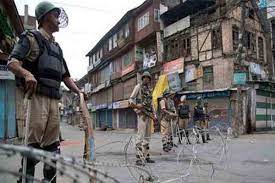Pakistan has reaffirmed its support to the people of Indian Illegally Occupied Jammu & Kashmir (IIOJK) and paid rich tribute to Iconic Kashmiri leader Syed Ali Shah Geelani for his life-long dedication and struggle for justice and freedom on his second death anniversary on September 1.
Pakistan Foreign Office Spokesperson underscored that Syed Ali Shah Geelani was a true voice and real face of the Kashmiris’ struggle for their rights and freedom, while Geelani’s unflinching commitment to the Kashmir cause had lit the candle of resistance in new generations of Kashmiris against brutal Indian rule tyranny.
Seven decades of occupation, barbarism and ignominy have passed since October 24, 1947. Kashmir is in chains and Kashmiris are in pain. Kashmiris’ struggle for their right to self-determination and freedom from Indian occupation continued uninterrupted over the past 76 years. Kashmiri men, women and youths wrote an unforgettable history of matchless sacrifices, hardships and struggle for their fundamental right to self-determination that had been categorically vested by the UN Security Council Resolutions and relevant global laws.
Syed Ali Shah Geelani was one of the founding members of the Kashmir freedom movement who dedicated his life to the Kashmir cause and was globally known for his resoluteness and commitment to the Kashmir freedom movement and love for Pakistan. The people and the government of Pakistan also have great respect for the Iconic Kashmiri leader and he will always be remembered for his unconditional Pakistanism, matchless sacrifices and peerless services for his nation and Pakistan.
Historically, The Kashmiri nation had been entrapped by a clever enemy who previously guaranteed the fundamental rights of the people of Kashmir and ensured the ultimate solution to the Kashmir dispute in line with the UNSC’s resolutions by granting special status to Jammu and Kashmir under the Indian constitution. Subsequently, Indian rulers scrapped Article 370 and Section 35A of the Indian constitution in August 2019 and are currently trying to project a false narrative of peace and normalcy in the occupied valley by organizing different events in the disputed territory which is otherwise one of the most militarized zones in the world.
The Kashmir issue is one of the oldest unresolved disputes on the agenda of the United Nations and its executive arm, the UN Security Council over the past seven and a half decades. However, the UN forum and global community largely put this grave political and humanitarian issue on the back burner because freedom of Kashmir currently does not serve the political and strategic interests of global powers; rather Kashmiri’s struggle is against New Delhi, which is a western darling and strategic ally of the United States. Unfortunately, Kashmiris neither have access to global power corridors nor have a say in global affairs while Pakistan is the only mouthpiece, that draws global attention to the Kashmir dispute and often highlights the urgency for an early settlement of the Kashmir dispute.
Those efforts had now lost momentum and largely became event-driven, as Pakistani leadership, strategists, and Intelligentsia have nothing except verbal assurances and customary statements regarding the decades-long human tragedy in Kashmir. Currently, Pakistani strategists are waiting for a suitable time and conducive global environment that leads to a peaceful resolution of the Jammu and Kashmir dispute, while there is no likelihood of such circumstances that enable Kashmiris to execute their right to self-determination until and unless this phenomenon suits global power brokers.
Amid such circumstances, Kashmiris are disappointed with the UN, and the Global community as well as with Pakistani leadership that has almost abandoned the Kashmir cause and betrayed the Kashmiri nation. The government of Pakistan must launch a fresh campaign at the global forums to sensitise the world about the severity of the world’s longstanding unresolved issue, which is not only a grave humanitarian crisis but a nuclear flash point between two nuclear-armed states in South Asia. Until and unless the global community does not resolve the Kashmir dispute, global peace can not be guaranteed in this part of the world.







